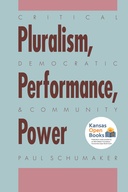Explore

Critical Pluralism, Democratic Performance, and Community Power
Paul Schumaker
1991
0 Ungluers have
Faved this Work
Login to Fave
A central question in political science is who governs and how.Typically political scientists attempt to answer this question by relying upon either empirical analysis, which explains existing political practices, or normative analysis, which prescribes ideal political practices.Political scientist Paul Schumaker rejects this distinction between empirical and normative theory. Instead, he weds the two approaches to create the new analytical mode he calls critical pluralism. With it he can measure variances in government from pluralist/democratic ideals and still provide theoretical explanations of why the variances occurred.Schumaker uses critical pluralism to describe, explain, and evaluate variations in three key measures of democratic performance: responsible representation, complex equality, and principlepolicy congruence. To test his framework and methodology he analyzes 29 community issues that arose in Lawrence, Kansas, between 1977 and 1987. The results of his study—one of the most comprehensive databases ever in the study of community politics—will be of interest to those who study community power. The conceptual framework itself and methodology used in assessing democratic performance will have a lasting impact on the way community government is studied.
This book is included in DOAB.
Why read this book? Have your say.
You must be logged in to comment.
Rights Information
Are you the author or publisher of this work? If so, you can claim it as yours by registering as an Unglue.it rights holder.Downloads
This work has been downloaded 60 times via unglue.it ebook links.
- 60 - pdf (CC BY-NC-ND) at Unglue.it.
Keywords
- Politics & government
- Regional government
- Regional, state & other local government
- Society & Social Sciences
- thema EDItEUR::J Society and Social Sciences::JP Politics and government::JPR Regional, state and other local government
Links
DOI: 10.1353/book.81043Editions

